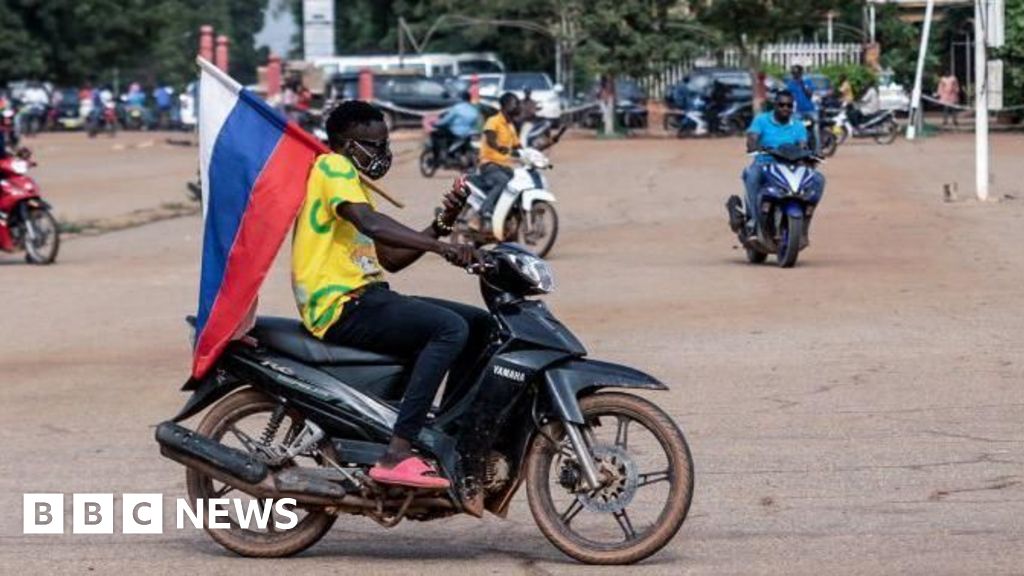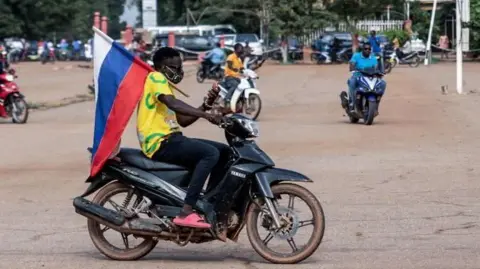 AFP
AFPYouth football players listen to the Russian national anthem before a match. Artists painted portraits of Russian President Vladimir Putin on a wall during a nearby graffiti festival.
Welcome to Burkina Faso, one of the African countries where Russia is ramping up its presence to gain influence.
The BBC has uncovered evidence that Russia is using media and cultural initiatives to attract African journalists, influencers and students while spreading misleading messages.
The events are promoted by Africa Initiative, a newly formed Russian media organization that defines itself as “an information bridge between Russia and Africa.” It inherited a structure previously established by the Wagner mercenary group, which experts believe has links to Russian security services.
Registered in September 2023, a month after Wagner leader Yevgeny Prigozhin died in a plane crash, Africa Initiative welcomed former employees of its defunct venture.
Its efforts are particularly focused on the three military-administered countries of Mali, Niger and Burkina Faso.
The West African countries have distanced themselves from Western allies such as France in the wake of recent coups, criticizing their failed interventions against jihadist groups and colonial legacies. Instead, they turned to Russia.
In addition to local cultural events, Africa Initiative maintains a news website with coverage in Russian, English, French and Arabic, as well as a video channel and five Telegram channels, one of which has nearly 60,000 subscribers.
Some Telegram channels were “recycled” from old channels established by groups related to Wagner. They were the first to promote the Russian Defense Ministry’s paramilitary Afrika Korps, which effectively replaced Wagner’s military wing in West Africa.
Pro-Kremlin narratives and misleading messaging, especially about the United States, are widespread.
Reports on the Africa Initiative website suggest without evidence that the United States is using Africa as a production and testing site for biological weapons, building on the Kremlin’s long-standing and notorious disinformation campaign.
One story echoed the Kremlin’s unsubstantiated claims that U.S. biolabs were moving from Ukraine to Africa. Another insisted, without evidence, that U.S. biolabs on the continent were increasing, claiming that “under the guise of research and humanitarian projects, the continent is becoming a testing ground for the Pentagon,” suggesting that clandestine biological experiments.
Researcher Jedrzej Cherep, head of the Middle East and Africa program at the Polish Institute of International Affairs, said that while Prigozhin’s propaganda campaign is mainly aimed at France, the Africa initiative “targets the United States to a greater extent.” “It’s even more anti-American.”
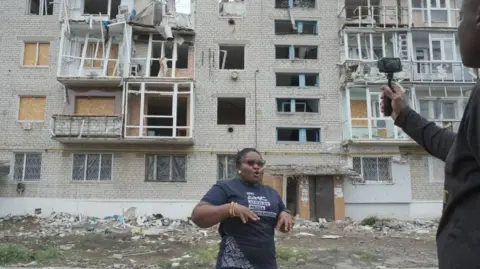 Russian Diary (Telegram Channel)
Russian Diary (Telegram Channel)In June, a group of bloggers and journalists from eight countries were invited to conduct a seven-day “press tour” in Russian-occupied Ukraine. The visit, organized by Russian state media and Western-sanctioned Russian officials, saw journalists visiting the Africa Initiative’s headquarters in Moscow.
“Africa doesn’t get much information [about the war]” Raymond Agbadi, a Ghanaian blogger and scientist who studied in Russia and participated in a “press tour” told the BBC. “No matter what information we got, it was not enough to make us convincing. Come and understand the true meaning of this war.
Also on the trip was American influencer Jackson Schinkel, an outspoken supporter of Russian President Vladimir Putin who has spread multiple false claims about Ukraine.
After visiting Moscow, the reporters traveled another 1,250 kilometers (780 miles) to the Ukrainian port city of Mariupol in the Donetsk region. They then went to towns in the Zaporozhye region – areas that Russia had captured in the early stages of a full-scale invasion of Ukraine.
Throughout the visit, journalists were accompanied by Russian officials and rode with the Russian military in vehicles bearing the “Z” logo – a symbol of Russia’s invasion of Ukraine.
In May, Africa Initiative organized a separate “press trip” to Russian-occupied Mariupol for a delegation of bloggers from Mali.
Press tours by journalists are a widely used tool in trying to sell a country’s point of view. However, although “Western media has done a lot of progressive training” [for journalists] “In order to cover key topics of global concern, Russia uses these tour guides as a way to spread certain narratives,” said Beverly Ochieng, a senior analyst at the Center for Strategic and International Studies. She noted that China Similar tours are also organized.
Having African journalists cover their travels would give an “authentic impression” as they “reach audiences in a language they recognize” rather than looking like it is “part of a wider campaign to portray Russia in a positive light”, Ms Ochieng said.
In reports published after the visit, African journalists referred to Ukrainian cities occupied by Russian troops as “Russian conflict zones” and quoted Russian-installed authorities, echoing Russian state propaganda and demonstrating the Kremlin’s influence on Ukraine. Border view.
Ghanaian journalist Ivy Setordjie wrote in an article published on JoyOnline, an English-language website operated by Multimedia Group, that Zaporizhia region in Ukraine [whose capital is under Ukrainian control]”located in the southern part of the European part of Russia”.
She told the BBC she disagreed with the areas being illegally annexed by Russia and confirmed her report reflected her own judgment and was “not biased” in favor of Russia.
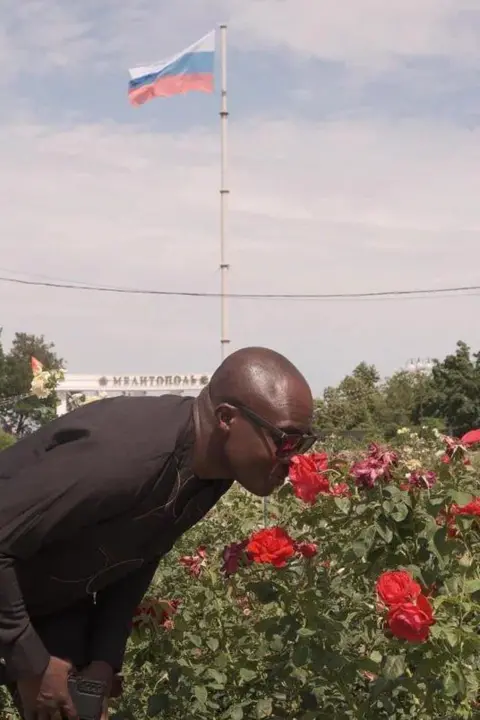 Mariupol News Network
Mariupol News NetworkIn addition to the media tour, Africa Initiative’s local branch in the Sahel region of West Africa is also active in community outreach aimed at boosting Russia’s image.
The BBC has been monitoring the Africa Initiative’s Telegram channel and Facebook page, where footage, images and reports of their work on the ground are shared.
In Burkina Faso we found reports of football matches with the Russian national anthem played, “friendship classes” in schools teaching students about Russia, Soviet martial arts “Sambo” competitions, first aid workshops for citizens and police, and graffiti Festival, participants painted Russian President Vladimir Putin and former Burkina Faso leader Thomas Sankara, all sponsored by Africa Initiative.
Images also show Africa Initiative members distributing groceries to locals and community screenings of the Wagner-backed documentary The Visitors, which tells the story of a group of Wagner coaches in the Central African Republic, where Wagner and its affiliates have been Helped the government fight insurgents for many years.
“The original idea of the Africa Initiative was to erase whatever Prigozhin had developed and replace it with something new. Later in the process, it seemed more reasonable to actually reuse all existing assets,” Polish International Affairs Research Mr. Czerep, a researcher at the institute, said.
He noted that Russia’s Federal Security Service (FSB) plays an important role in the new organization. The head and editor-in-chief of “Africa Initiative” is Artyom Kureyev, who is confirmed by Russian experts to be an agent of the Russian Federal Security Service. Kuleyev has ties to the Valdai Club, a Moscow-based think tank close to President Vladimir Putin.
The Africa Initiative website lists former Wagner press officer Anna Zamaraeva as deputy editor.
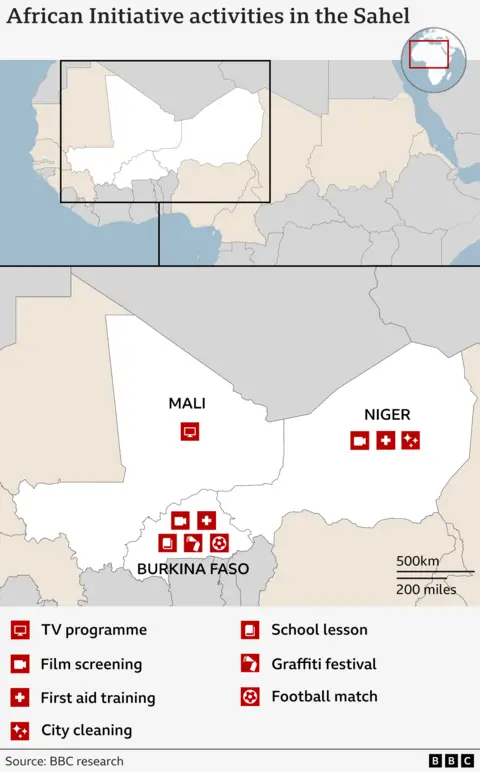
Viktor Lukovenko, known as one of Prigozhin’s “political technologists”, founded the Burkina Faso office of the African Initiative but left the post in recent months. Lukovenko, a former Russian nationalist with a criminal record, was sentenced to five years in prison for an attack in Moscow on a Swiss citizen who later died.
We contacted Africa Initiative for comment. Its Moscow office confirmed it received our inquiry but did not respond. We also contacted the Russian government but did not receive an answer.
In February this year, in response to the U.S. State Department’s report, the Africa Initiative website published an article stating that its editorial board “insists that its purpose is to spread knowledge about Africa in Russia and popularize Russia in African countries” and gave “various Africans have the opportunity to express their opinions, including their criticism of Western countries.”
At the same time, the organization continues to increase its outreach activities in the Sahel region. In the last week of August, about 100 students from Burkina Faso attended lectures on training opportunities in Russia.
“I learned about Russian culture and the relationship between our two governments,” a smiling teenager wearing a T-shirt emblazoned with the Africa Initiative logo said in a video recorded after the discussion.

